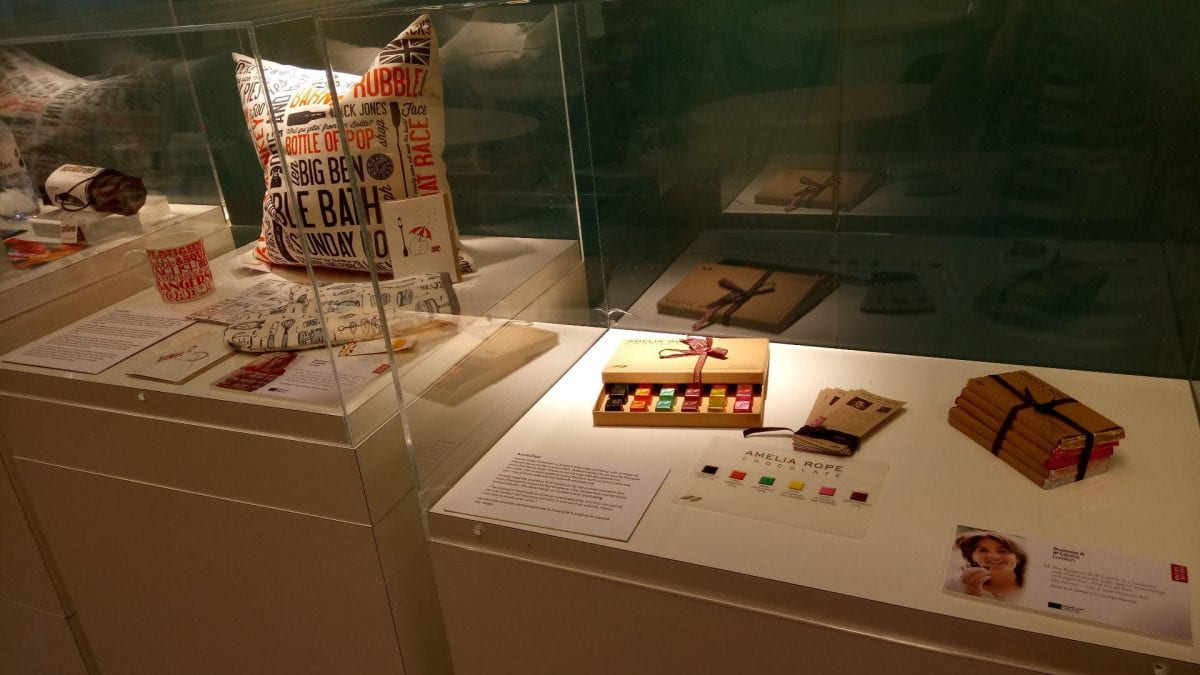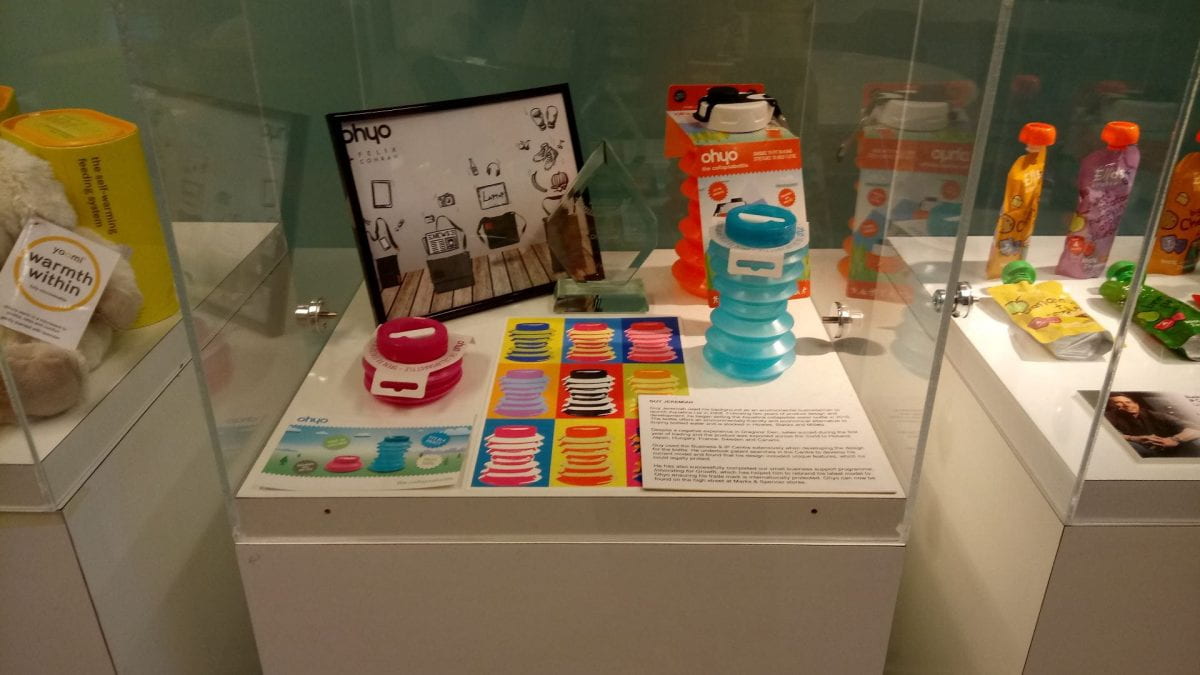Recently, a group of library staff visited Business and IP Centre (BIPC) at the British Library. Seema Rampersand was our host for the two hour visit, and she gave an extremely informative talk on BIPC’s origins, and how it serves small businesses, start-ups and entrepreneurs.
The BIPC reading room consists of two floors. The entrance to the reading room is on the 1st floor, next to the Alan Turing Institute. Readers without tickets can utilise the open meeting space and resources on display in the entrance area. The 2nd floor is accessible from within the reading room. It houses trade and industry related journals and newspapers.

Entrance area display
Our host was very enthusiastic about the creativity that comes out from the users who visit the BIPC and the eye-catching display in the entrance area attest to this. Some successful inventions and products by BIPC alumni can be found here, including:
- The Ohyo collapsible waterbottle by Jeremiah Guy. We learnt BIPC staff helped to check that the waterbottle name and design was unique and would not cause legal problems.
- Ethically sourced chocolate by Amelia Rope. This business got funding help from the BIPC through its Innovating for Growth programme (for established small businesses) and the founder apparently also made extensive use of BIPC resources for market and product research.
We even learnt that reason for the appearance of around pomegranate juice on our supermarket shelves also has its roots in the BIPC. Pomegreat founder Adam Pritchard apparently used the library to research on marketing the benefits of the (I was going to describe it as “exotic” but it’s hardly that anymore!).


Origins
The Business and IP Centre was set up in 2006 with funding from the London Development Agency to support “entrepreneurs, inventors and small businesses from that first spark of inspiration to successfully launching and developing a business”[1]. According to our host, it was greatly inspired by the New York Public Library’s Science, Industry and Business Library. Along with the SIBL, the BIPC purports to be unique in that it is a dedicated business and IP centre for anyone who want to run their own business.
Development
Whilst it was originally set up in London, the BIPC has, over the years, partnered with public libraries/local authorities around the around the UK to enable easier access to business resources and advice. At present, an additional National Network of thirteen business and IP resource hubs exist. Seema commented that this demonstrates the impact of the BIPC goes beyond the London area, and shows that it is worthwhile to invest public spending on libraries and information resources. The most recent addition to the network is Glasgow.
User support
So how does the BIPC at Kings Cross support its users?
Physical spaces
- Offers a physical reading room with computers for people. These computers also allow access to business and IP related databases.
- Offers a space for events, meetings and discussion, though our host commented that this was not a private space, thus not suitable for anything confidential.
Collections
- Walk-in computer access for registered readers to online business, market research and journals databases including FAME, Orbis and ABI Inform, though there are restrictions as to how much a user can access or download. You can view a comprehensive list of them here.
- Print book collection which includes books on how to start your own business (picks include song-writing, dog-walking, and your own coffee shop) and market research reports. There is also a sizable IP law collection and many, many looseleafs.
- Houses the UK national patent collection, though it is no longer really updated as more and more patent information becomes available freely online. Collection exists in print, and on micro-fiche and CD-rom. Users can download up patents to five per week. Staff can also help users in searching them. You can find out more at: https://www.bl.uk/collection-guides/patents.
Advice, workshops, networks, and research services
Personally, I felt that the best thing about the BIPC is the breadth and depth of help someone could potentially get from the librarians and the BIPC “alumni” network. We learnt that users have access to:
- Free 1-2-1 advice from staff to discuss things like the feasibility of a business idea or plan, resources from the BIPC or elsewhere that might be useful, and researching IP
- Free up-to-date Industry Guides which introduce relevant information sources for people with little knowledge of where to start. Staff also maintain IP Guides for researching copyright and IPR. In particular, I was impressed that there was even a guide on intellectual property protection for board games. You can find all their guides at: https://www.bl.uk/business-and-ip-centre/industry-guides.
- Over twenty free and paid workshops per month on skills and other topics essential to starting ones own business. During the trip, I noticed that a group were holding a workshop on selling fashion online. More information is available at: https://www.bl.uk/business-and-ip-centre/workshops-and-events.
- Paid research services, though our host said they did not get too many requests for these. You can find out more about the service and the rates at: https://www.bl.uk/business-and-ip-centre/our-research-service.
- Support from alumni network of people who have used the BIPC and made their business a success. Some of them stay in touch with the BIPC, and return to attend events and pass on their stories. There is also a mentoring scheme that users can take advantage of.
- Finally, the BIPC can also recommend external consultants if their resources aren’t quite what the user is looking for.

Conclusion
This was a fascinating trip for me, and I’m sure it was the same for the other attending library members. Some of the members in our group were also discussing how the BIPC would be a great additional resource for enterprise or business students needing advice or inspiration and I also think it would be great for City students to use it!
Many thanks to Chloe for organising the trip.
Attendees: Catie, Chloe, Georgina, James, Samantha, Stephanie, Tamsin
References
[1] Written evidence from the British Library. Available at: https://publications.parliament.uk/pa/cm201011/cmselect/cmbis/434/434vw08.htm.
Web references
British Library Collection Guides: Patents. Available at: https://www.bl.uk/collection-guides/patents.
British Library: Find electronic resources. Available at: https://electronicresources.bl.uk/sfxlcl41/az/londb.
Business & IP Centre: National Network. Available at: https://www.bl.uk/business-and-ip-centre/national-network.
Business & IP Centre: Free industry and IP guides. Available at: https://www.bl.uk/business-and-ip-centre/industry-guides.
Business & IP Centre: Innovating for Growth Scale-up. Available at: https://www.bl.uk/business-and-ip-centre/innovating-for-growth.
Business & IP Centre: Our research service. Available at: https://www.bl.uk/business-and-ip-centre/our-research-service.
Business & IP Centre: Workshops and events. Available at: https://www.bl.uk/business-and-ip-centre/workshops-and-events.
Enterpreneuship. Available at: https://www.city.ac.uk/entrepreneurship.
Science, Industry and Business Library (SIBL). Available at: https://www.nypl.org/locations/sibl.
Thanks Stephanie! I’ve already contacted the person in charge of supporting student entrepreneurship here at Cass to ensure that she’s up to date with what they can offer – such a great visit, and many thanks to Chloe for organising it as well as Stephanie for writing it up.
Yes, I remember that you and Catie were exchanging lots of excited looks (and having interesting discussions) during that talk! Hope it goes well.